Under the sign of the woodpecker
In the 1980s, no Austrian publishing house had a publishing program focussed on translations from the Netherlands and Flanders. This only changed with the first translations from Dutch published by Picus in the 1990s.
Picus
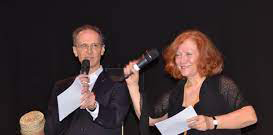
In 1984 Dorothea Löcker and Alexander Potyka, both from Vienna, founded the publishing house Picus. From the very start the publishers chose to present a wide variety of titles which was crowned by success as Picus' books were sold throughout the German speaking regions. In 2010 about 70 percent of the books by Picus were sold in Germany, 28 percent in Austria and 2 percent in Switzerland. Next to fiction and non-fiction (e.g. books on travel, contemporary art, history, architecture, and memoirs), children's books are one of the main focuses of Picus.(#Publishers; #Children's literature)
“The internationally oriented children's books program defines children's literature first and foremost as literature. It isn't pedagogical or didactical criteria that are prioritized, but the quality of stories and illustrations, the loving make-up of books and an oftentimes easy-going humour.” (Picus Verlag Ges.m.b.H., 2009, p. 6)
Spooky stories

In 1990 the first children's book translated from Dutch was published by Picus. Entführungsfall Schildkröte [Abduction Case Turtle] is the first part of the series on master detective Micki Hammer by Paul van Loon, who is primarily known as author of horror stories. The first part of the Micki Hammer-series was translated by Hester Stöbe and Picus’ publisher Alexander Potyka. The book was a success and in the 1990s more translations of books by Van Loon followed, some were even produced as audio-books on cassette by the ORF and published under the name Jumbo.
With their translations of his books, Picus not only laid the foundation of Van Loon’s success in Austria, but also led to the widespread dissemination of his oeuvre in the entire German speaking world. The title Der Dieb, vor dem nichts sicher war [The Thief from Whom Nothing Was Safe] was picked up by the Fischer Taschenbuch-Verlag three years after it was published by Picus in Austria. Similarly, Der Vampirklub [The Vampire Club], which was published by Picus in 1997, was republished one year later in Germany as a paperback by the Arena-Verlag in Würzburg.
With their translations of his books, Picus not only laid the foundation of Van Loon’s success in Austria, but also led to the widespread dissemination of his oeuvre in the entire German speaking world. The title Der Dieb, vor dem nichts sicher war [The Thief from Whom Nothing Was Safe] was picked up by the Fischer Taschenbuch-Verlag three years after it was published by Picus in Austria. Similarly, Der Vampirklub [The Vampire Club], which was published by Picus in 1997, was republished one year later in Germany as a paperback by the Arena-Verlag in Würzburg.

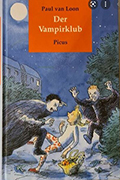
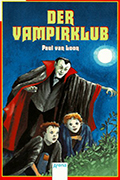

Der kleine Esel

Rindert Kromhout is another important author from the Dutch-speaking world whose books were published by Picus. Kromhout’s books have been translated into many different languages and have repeatedly won prizes. His stories about a small donkey that were published by Picus from 2000 on found a large audience. Kromhout was introduced to Austrian audiences by the renowned author Rolf Erdorf – the translator of Jan de Leeuw, Helga Ruebsamen, Edward van de Vendel and Jan Willem van de Wetering among others. However, most of Kromhout’s works published by Picus were translated by Daniel Löcker, the son of the publisher, children’s book author and illustrator Dorothea Löcker.
Refined and convenient to buy
In the 1990s Rolf Erdorf also introduced Joost Zwagerman to the German-speaking audiences. Several editions of Zwagerman’s novel Falsches Licht [False Light] appeared among the titles of various publishing houses (Klein, Bertelsmann, Goldmann) between 1995 and 1997. Ultimately Erdorf returned to Picus with his translations of Zwagerman.
“’A publishing house’, says Alexander Potyka, is ‘simply not a printing house’. Even in a company with smart interests one has a responsibility towards the authors. With the profession of publisher one decides against a life of wealth, says Alexander Potyka not entirely without vanity. And from this vantagepoint of enthusiastic detachment, one observes the frivolous hustle and bustle of the book industry at the Viennese private publishing house. The emergence of true literary corporations is seen with a reluctancy, which is not mistaken about the fact that due to one’s ambitions to produce quality one might have to leave it be completely one day. But nobody at the Viennese publishing house currently believes that it could come to this.” (Jandl, 2002)
Befitting the plan of the publishing house Picus to raise awareness for authors that – to say it with Paul Jandl’s words – had had their breakthrough on the international market with ‘marketable and yet sophisticated literature’ (Jandl, 2002), Erdorf’s translation of Joost Zwagermans Die Nebenfrau was published in 2000.
Die Nebenfrau
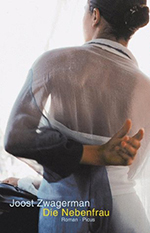
Zwagerman’s ‘Nebenfrau’, the story of Theo Altena who is ‘devoid of feelings’ (Lang, 2000) was well received. Hermann Wallmann wrote “refined” and “virtuosic” in the Süddeutsche Zeitung of the 20th of May 2000 and compared Die Nebenfrau with Goethe’s Wahlverwandschaften. A few months later Clemens Ruthner winkingly recommended the book to the FPÖ as ‘mandatory reading not only for national-liberally affiliated teachers in compulsory schools’ (Ruthner, 2000). Unfortunately enough, this didn’t lead to a breakthrough in Austria for Zwagerman, nevertheless, he stayed present in the German-speaking world. As many other titles of the publishing house Picus, Die Nebenfrau was later published in Germany under license by Diana Taschenbuch in 2001.
Kunstlicht
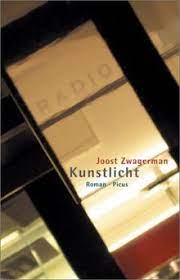
In 2002 the Picus Verlag retried to promote a title by Joost Zwagerman, this time the novel Kunstlicht [Artificial Light] translated by Martina Den Hertog-Vogt, also known in the German-speaking area as the translator of Harry Mulisch’s works. Literally translated the original title of the book is ‘Chaos and noise’, the story proceeds accordingly. Kunstlicht describes the odyssey of Otto Vallei “through the Amsterdam of disappointed wives, of shifty publishers, of substitute careers in radio talk shows and of fellow writers, in whose roman à clef one inadvertently ends up in as a character” (Ruthner, 2002). Unfortunately, the book’s translation is far too ‘embellished’, wrote Clemens Ruthner in Der Standard. Moreover, Kunstlicht was ‘rather secondary with regard to the publishers’ compared to the ‘brilliant’ Nebenfrau. Ruthner thus expressed himself rather skeptically and a few months later Dorothea Dieckmann voiced her agreement in the Neue Zürcher Zeitung (Dieckmann, 2002). For her, Zwagerman's ‘satire’ was primarily ‘skilful entertainment(craft)’.
Until further notice?
What role these critical reflections played in regard to no new titles by Zwagerman appearing after 2002 is unclear. Things quietened in the German-speaking world regarding Zwagerman.
It was not until 2005 that Gregor Seferens took Zwagemans oeuvre under his wing and published translations of his works with Piper, Weidle and Kiepenheuer&Witsch. It got quiet with regard to Dutch literature at Picus. The program of children’s and youth literature was continued for some time, but after 2005 no more translations of Dutch books appeared, at least until further notice.
(Herbert Van Uffelen)
References
Dieckmann, Dorothea: Otto Normalschriftsteller - Joost Zwagermans Literaturbetrieb-Satire «Kunstlicht». In: Neue Zürcher Zeitung, Vol.: 20-06-2002 - Zürich, (2002).
Picus Verlag Ges.m.b.H.: 25 Jahre Picus Verlag, Wien: Picus Verlag (2009).
Jandl, Paul: Halbe Heimaten, ganze Bücher - Der Wiener Picus-Verlag und sein engagiertes Programm. In: Neue Zürcher Zeitung, Issue: 15. Jan. - Zürich, (2002).
Lang, Sandy; K.N.: Aufgeblättert Spezial. In: Falter, Vol.: Nr. 45 - Wien, (2000) - p. 74.
Ruthner, Clemens: Schwarz-Weiß-Malereien des Begehrens - Eine "liaison dangereuse" im späten 20. Jahrhundert. In: Der Standard, Vol.: [16.09.2000] - Wien, (2000) - p. 13.
Ruthner, Clemens: Lebenskrise, literarisch - Joost Zwagermans gesprächiger 'Writer’s block' in Amsterdam und wie er ihn überwindet. In: Der Standard, Vol.: 04.05.2002 - Wien, (2002) - p. S. 8.
Wallmann, Hermann: Moral der Liebe - 'Die Nebenfrau' von Joost Zwagermann. In: Stuttgarter Zeitung, Vol.: 116, (20.5.2000)
